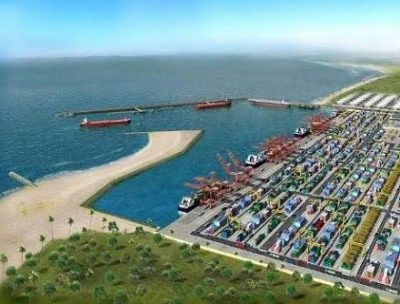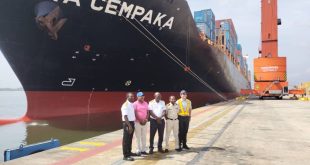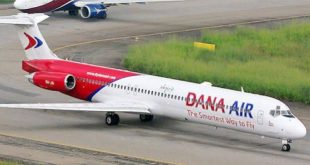
- Nigeria Needs Only 2
- Multiplicity of deep seaports “A Fad” — Expert
By Kenneth Jukpor & Oyeniyi Iwakun
While Federal Government and several state governments are making frantic efforts to woo investors in order to actualize their desire for developing new deep seaports, experts have said that such adventure is a misplaced priority, noting that Nigeria needs just two viable deep seaports, strategically positioned as transshipment hubs and not the multiplicity of deep seaports in the country.
It has also been discovered that the Federal Ministry of Transportation encourages state governments to waste funds on deep sea projects for want of ideas to market under the public private partnership(PPP) to investors all in a bid to score some political gains. Some of the deep sea port projects have been found to be technically and commercially unviable and unrealizable, reports have shown, yet the ministry still promotes them.

Some deep seaport projects springing up in different parts of Nigeria include; Badagry and Lekki in Lagos, Olokola in Ondo, Ibaka in Akwa Ibom and Bakassi in Cross River states, as well as an oil and gas deep sea port in Age, Bayelsa State.
Industry stakeholders and economic experts have also expressed worry over the seeming utopian nature of these projects considering their huge financial outlays . Lekki deep seaport would be competing with Badagry and Olokola when one should sufficiently service the entire South-West. On the other hand, Ibaka has to contend with Bakassi and the emerging deep seaport in Cameroon, Kribi. In the midst of the seeming competition, cargo which determines the viability of the deep sea ports is lacking both in export and import.

Speaking with MMS Plus, the Dean, School of Transport, Lagos State University (LASU), Mr. Samuel Odewunmi said the quest by several State governments to build new deep seaports is just to catch the “fad”.

Odewunmi lamented that very state wants to have a deep seaport, “They are doing it in an atomistic manner. You can be sure that they won’t take it into any reasonable conclusion. If these governors are serious, they would have done their homework on the viability or otherwise of the proposed deep seaports and they would realize that such projects wouldn’t be viable.”
“We don’t need more than two or three; even one very good deep seaport that can also be a transshipment hub is sufficient. So the waterways can become busy as containers are moved from the transshipment hub to other ports. This is the more appropriate way of doing things in the transport sector. People catch a fad; when they catch it everybody will be announcing it. Today, that fad is the development of deep seaports”, he added.
There have been an increasing crave for deep seaports in Nigeria in recent times possibly due to the fact that Nigeria needs to grow beyond its reliance on existing regular ports in Cross Rivers, Rivers, Delta and Lagos States amongst which only Lagos had been maximized with over ninety five percent (95%) of export and import activities being carried out at Lagos ports.
Deep seaports are usually designed to carter for the carriage of very large and heavily loaded ships which may require the draft to be 30ft deep or even more. They are ports that are built on locations that have direct access to the open waters of sea or ocean unlike regular ports that are stationed on river or water channels that have access to a sea or ocean.
Transshipment is the shipment of goods or containers to an intermediate destination, then to yet another destination. The transshipment of containers at a container port or terminal is the number or proportion of containers, possibly expressed in TEU, of the total container flow that is handled at the port or terminal and, after temporary storage in the stack, transferred to another ship to reach their destinations.
Transshipment may differ in conception between ports, mostly depending on the inclusion of inland water transport, barges operating on canals and rivers to the hinterland. A change to another international deep-sea container ship; or include both seaborne and inland waterway ship transfers. In both cases, a single, unique, transshipped container is counted twice in the port performance, since it is handled twice by the waterside cranes.
Speaking exclusively to MMS Plus recently, the Chairman, Nigerian Ports Consultative Council, Otunba Kunle Folarin argued that as a result of the dilapidated state of the nation’s roads and rail infrastructure, the availability of transshipment points would complement the massive development of seaports in the country.
Otunba also expressed optimism that such transshipment ports could be enhanced to service other coastal states within the West and Central African region.
“We need to decide if we actually need a transshipment point because it would be a dedicated area for transshipment cargoes. These are cargoes that are going to be transshipped as their final destination isn’t Nigeria”
The former managing director of the Nigerian Ports Authority(NPA), Engr. Omar Suleiman, had said at a forum in Lagos three years ago that most of the deep sea ports springing up in recent times were politically motivated because where there is no cargo, there is no port.
Before now the Infrastructure Concession Regulatory Commission(ICRC) had only approved the Outline Business Case(OBC) of only three deep sea ports in the country, while NPA had also stated that the same three proposed and OBC- approved deep sea ports were captured in the national port development master plan. However, suddenly, all the deep sea port proposals beat the ICRC and NPA regulatory huddles, with the Minister of Transportation always ever-ready to secure the approval of the Federal Executive Council(FEC) for the promoters, while the ministry officials compete for the membership of the different implementation committees.
Copyright MMS Plus.
All rights reserved. This material, and other digital content on this website, may not be reproduced, published, broadcast, rewritten or redistributed in whole or in part without prior express written permission from KINGS COMMUNICATIONS LIMITED.
 MMS PLUS NG – Maritime, Aviation, Business, Oil and Gas News Online Newspaper with coverage in Maritime, Oil and Gas, Aviation, Power and Energy as well as Financial News
MMS PLUS NG – Maritime, Aviation, Business, Oil and Gas News Online Newspaper with coverage in Maritime, Oil and Gas, Aviation, Power and Energy as well as Financial News









